Over the past 2 years, we’ve audited more than 2,000 AdWords accounts at Disruptive Advertising.
We’ve looked at over $320 million in ad spend, 90 billion impressions, 500 million clicks, and more than 26 million keywords in hundreds of industries across the world.
Amongst all that data, we’ve made some important discoveries.
iSpionage provides a ton of helpful information about your competition’s keywords, but to effectively run your campaigns you need to understand which of those keywords are actually producing value.
Are You Tracking Conversions?
Before we dive into the data, I want to make a quick comment about conversion tracking:
Across 2,000+ AdWords accounts, only 29% were tracking conversions effectively.
42% had no conversion tracking in place at all. Another 29% had made a token effort at conversion tracking, but only 29% of AdWords accounts actually know which keywords produce conversions.
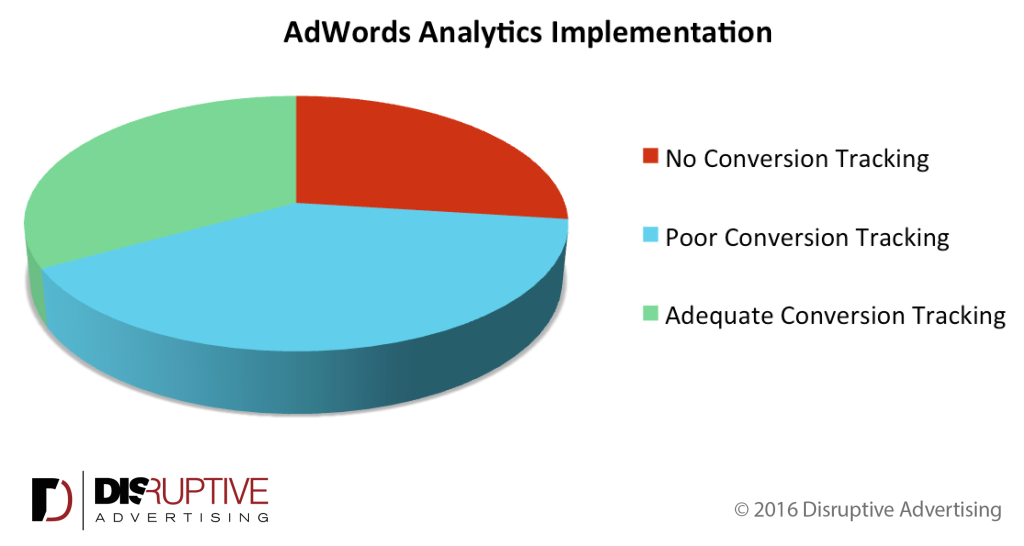
If you don’t have good tracking in place, you don’t know what’s working and what isn’t. That means you can’t optimize your campaigns to produce profitable results.
And, as a result, 97% of AdWords campaigns without quality tracking fail.
So, if you want to put yourself ahead of the competition, start by tracking everything!
Keyword Efficiency
Hopefully, if you use iSpionage, you understand how keywords relate to search intent.
Paid search advertising is intent-based marketing. You want your ads to show up for internet searches that lead to sales, so you need to pick keywords that indicate a strong purchasing intent.
To do that, you just need to bid on every keyword that is related to your product or service, right?
Sadly, it’s far from that simple.
Most advertisers bid on way too many keywords. Afraid of missing out on potentially interested customers, they cast as wide of a keyword net as possible.
The problem is, the bigger your net, the more money you spend on the wrong searches.
As it turns out, the vast majority of conversions—let alone sales—come through a mere handful of your keywords.
In fact, less than 6% of keywords produce conversions.

Obviously, all those extra keywords make for unnecessarily complicated campaigns, but the real question is, do extra keywords affect profitability?
Search Term Efficiency
To answer that question, we need to take a look at search terms.
Keywords are how you target the search intent of your audience, but search terms are how your audience actually discovers your ads.
In other words, your search terms reveal the quality of your keywords.
Fortunately, AdWords provides insight into the search intent of your audience through the Search Term report.
The Search Term Report
The Search Term report allows you to see exactly what searches triggered your ad and how many impressions, clicks and conversions each search term produced.
If you’re using the right keywords, your ads should show up when people are searching for what you have to offer. As a result, clicking your ad should take them to a landing page that meets their needs.
However, if your ads are showing up for the wrong keywords (eg, the search intent is wrong), people might click on your ads, but they certainly won’t convert.
So, if most of your search terms don’t produce conversions, you’re spending a lot of money on the wrong keywords.
The question is, what percentage of ad spend actually goes towards keywords that convert?
Where’s Your Money Going?
Across the well-tracked accounts we audited, 61% of ad spend was spent on keywords that never converted.
However, as you can see below, companies that spend more on AdWords also tend to waste less money on the wrong search terms.
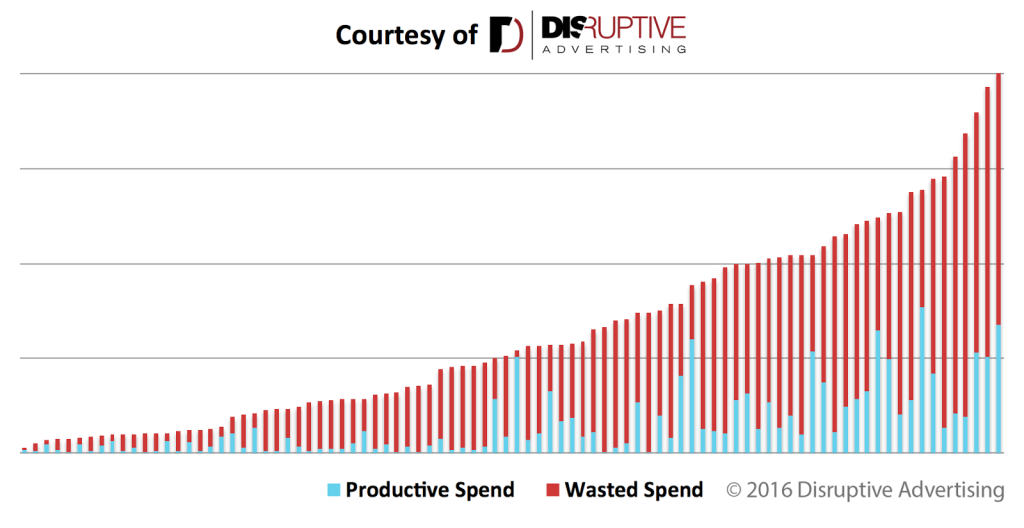
If we look at wasted ad spend on a per account basis, the statistics are even worse:
The average AdWords account wastes 75.80% of it’s budget.
That means you are probably spending 76% of your AdWords budget on searches that will never produce any value for your business.
But, so is your competition.
However, if you are tracking conversions, you can use your conversion data to profoundly impact the performance of your AdWords campaigns.
The Exponential Cost of Wasted Ad Spend
At first blush, you’d think the connection between wasted ad spend would be linear—every 10% increase in wasted ad spend would increase your cost-per-conversion by around 10%.
Unfortunately, that isn’t the case.
As it turns out, the relationship is actually exponential—every 10% increase in wasted ad spend increases your cost-per-conversion by 44-72%.
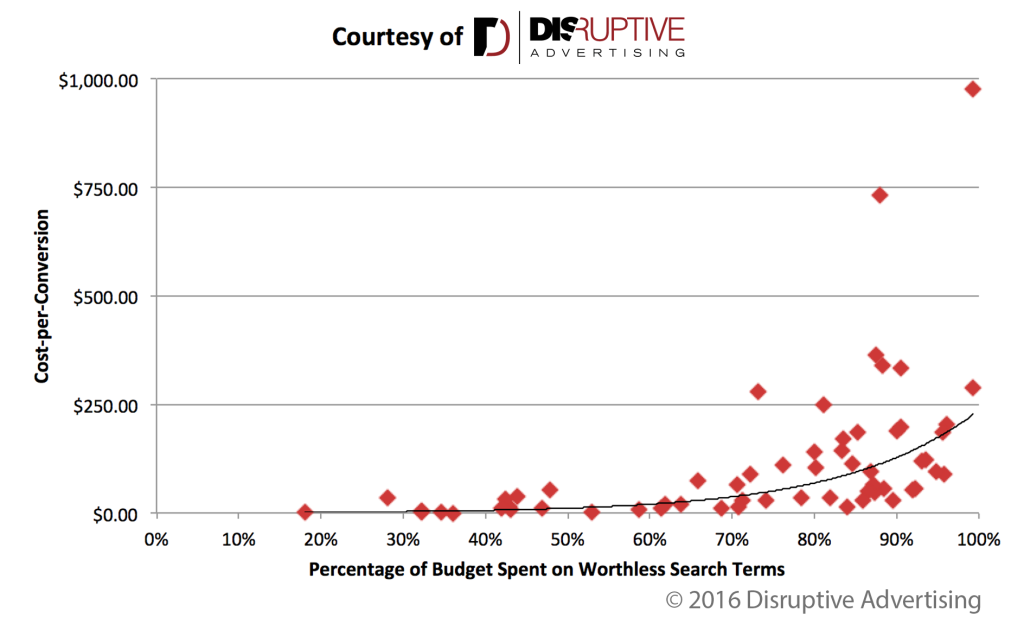
What does that mean for your business?
Well, to put it in concrete terms, if your cost-per-conversion is $10.00 and your wasted ad spend goes from 30% to 40%, your new cost-per-conversion will be around $14.43-17.22.
If it goes from 30% to say, 75.80%, your cost-per-conversion could be over $120!
When you think about it, these results actually make a lot of sense. Every dollar you waste on non-converting keywords is a dollar you could have spent on keywords that convert.
This model isn’t perfect, but it’s a much better predictor of cost-per-conversion than metrics like quality score.
Here’s how cost-per-conversion varies with impression-weighted quality score.
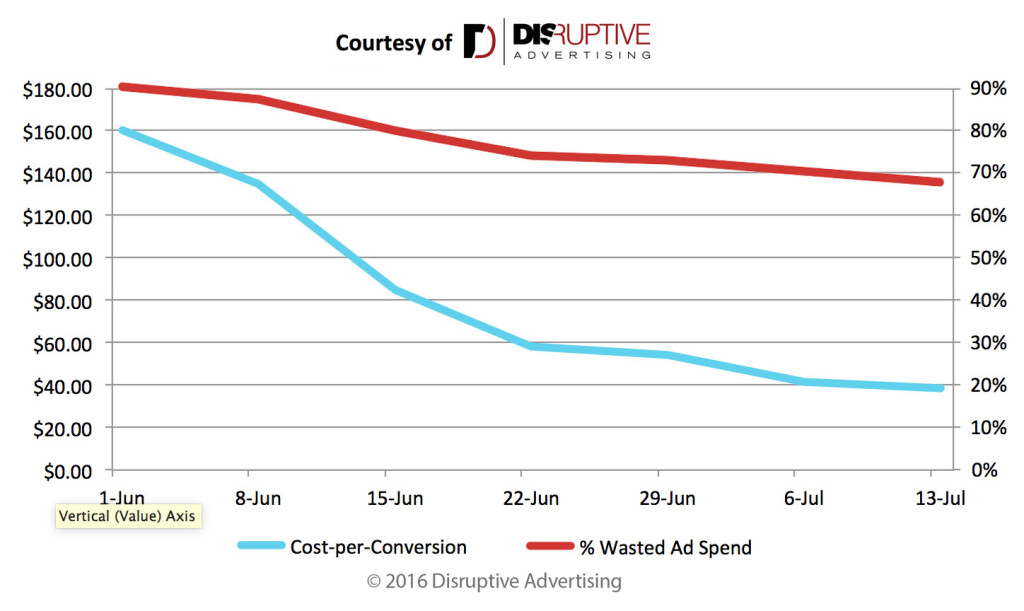
On the surface, it looks like a pretty direct correlation—as quality score increases, cost-per-conversion decreases.
In fact, these results are strikingly similar to those reported by Wordstream. Every 1-point increase in quality score reduces cost-per-conversion by 17.5%.
Or does it?
It turns out that a quality score-based model explains less than 5% of the variability in the data. Statistically speaking, that’s a completely worthless model.

By comparison, wasted ad spend explains 60% of your cost-per-conversion (? < 0.01).
And, it explains why improving your quality score often does little to improve your cost-per-conversion.
If you are wasting 75.8% of your ad spend to begin with, improving your quality score isn’t going to lower your cost-per-conversion by much.
However, if you’ve eliminated most of your wasted ad spend, a higher quality score will reduce your cost-per-click and—by extension—your cost-per-conversion.
Putting the Data to Work
So, what can you do with all this data? Quite a bit, actually.
This exponential formula also works in reverse.
As you identify your effective keywords, eliminate your non-productive keywords and reduce your wasted ad spend, your cost-per-conversion will decrease…exponentially.
For example, here’s what happened in a matter of weeks to one of our accounts when we used this approach:
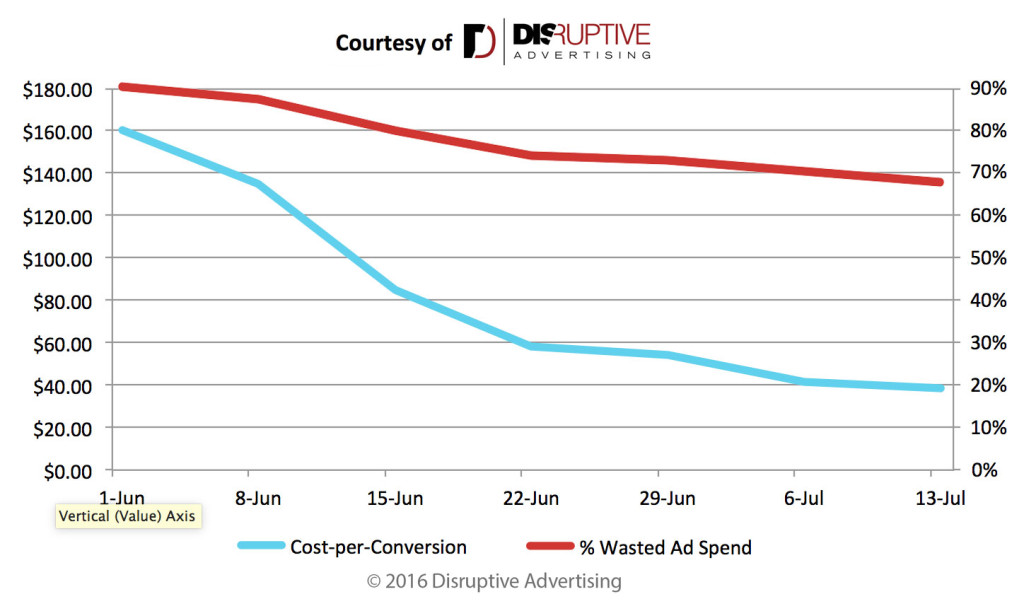
Over the course of a few weeks, wasted ad spend dropped from 91% down to 68%. As a result, cost-per-conversion dropped from $160.38 to $38.58!
Once you understand this principle, putting it into practice is fairly simple.
Here’s how:
- Do your keyword research. Use iSpionage to identify the best keywords for your account (including your competition’s keywords).
- Set up conversion tracking. For AdWords help, click here.
- Run your account for 2-3 months. To get a feel for which keywords are effective, you need to have at least 2-3 months of data.
- Run a keywords/search terms report in AdWords. Open AdWords, click on the Keywords tab and create a filter for “Conversions < 1”. Run the report on your last 2-3 months of data.
- Identify your wasted ad spend. Scroll to the bottom of your report to see how much you are wasting on non-converting keywords. Compare that number to your total spend to see what percentage of your ad spend is wasted.
- Eliminate your wasted ad spend. Get rid of keywords that aren’t producing results.
- Profit. You’ll start spending less without reducing your number of conversions. That equals more profit.
- Repeat. It’s well worth it to go through this evaluation on a regular basis. Each time you do it, your budget will become more effective.
And that’s it! It takes some effort and persistence, but remember, reducing your wasted ad spend by even 10% can cut your cost-per-conversion in half.
Conclusion
When it comes to keywords, less is actually more. It seems a bit counterintuitive, but the less keywords you bid on, the more effective your budget will be.
The trick is identifying which keywords will drive the results you need.
This is why competitive keyword tools like iSpionage are so important for successful paid search marketing. They allow you to identify which keywords your competition is bidding on, figure out what is really working, and then beat your competitors with their own keywords.
Your competition is wasting 76% of their budget on the wrong keywords—but if you cull your non-converting keywords—you don’t have to.
About the Author

Jacob is passionate entrepreneur on a mission to help businesses achieve online marketing success. As the Founder & CEO of Disruptive Advertising, Jacob has created an award-winning, world-class organization that has helped over 2,000 businesses grow using pay-per-click advertising and conversion rate optimization.











